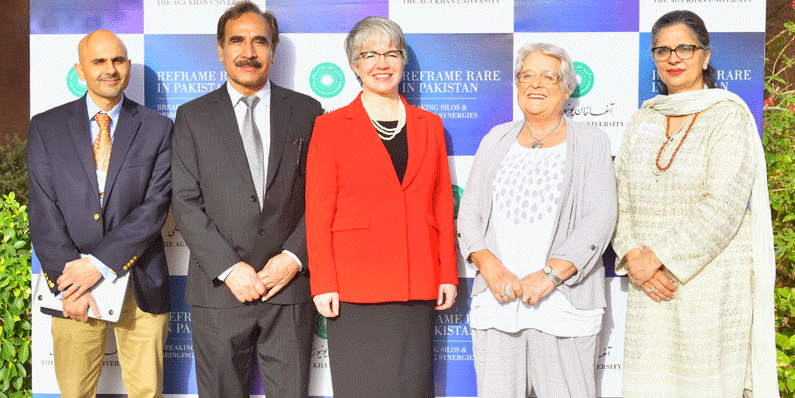‘Simple test can detect rare diseases in newborns’
KARACHI: Experts at a conference held in connection with Rare Disease Day 2020 at the Aga Khan University (AKU) have said that policymakers and stakeholders must pay greater attention to the challenges posed by rare diseases in Pakistan, mentioning that a simple blood test — compulsory in developing countries — can enable the prompt detection and treatment of over 50 rare illnesses.
Worldwide, there are over 6,000 diseases classified as “rare” as they affect fewer than 1 in 2,000 people. In Pakistan, these diseases are not so rare because a major risk factor is prevalent: inter-family marriages which significantly raise the risk of their children suffering from genetic defects and disorders.
Dr Bushra Afroze, associate professor at AKU and a clinical geneticist at the University’s teaching hospital, shared the story of a girl from a small town in Sindh to explain how the health care system’s shortcomings were affecting those living with rare diseases.
The girl in question was eight when the unusual symptoms started to appear. She began to lose her hair, fall over while walking, be inattentive in class and face difficulties in writing. She was taken to a neurologist and erroneously diagnosed with a non-treatable disorder. When she started to experience additional symptoms such as the tendency to repeat words, she was thought to be “crazy”.
Owing to the continuous efforts of the girl’s parents, she was finally referred to a genetics specialist in Karachi to learn that their daughter has remethylation defect in vitamin B12, a serious metabolic disorder. She was prescribed disease-specific ‘orphan’ drugs – medication for a condition so rare that it is not feasible to mass produce – that are very expensive. She must have medication daily and will require continual monitoring and management of her condition. The girl is a happy child, attending school and enjoying her childhood.
Dr Afroze explained that providing quality care to children such as the girl in question requires high-quality system-wide changes that can address several constraints: a lack of awareness; shortage of facilities, expertise and institutions as well as the geographic and economic inequities that people with rare diseases face.
According to her, there is a range of gaps in the arrangements to provide quality care for patients suffering from rare diseases, adding: “Narrowing these gaps will require collaboration between stakeholders across the spheres of research, healthcare, academia and government”.
As a first step, experts at the conference highlighted the importance of screening newborns for rare diseases. A simple blood test — compulsory in China, Canada, the US, as well many countries in Asia and Europe — can enable the prompt detection and treatment of such conditions.
AKU’s Professor Aysha Habib, chair of the conference, explained that tests that can screen for over 50 rare illnesses have been common in the developing world for over 50 years. In Pakistan less than 1 per cent of newborns are currently being screened for these diseases, since only a handful of private hospitals offer these services, and for a narrow range of just five rare diseases.
She added that more hospitals need to offer screening for rare diseases and called on the government to consider how such services could be scaled up by it.
 The conference “Reframe Rare in Pakistan: Breaking Silos and Bringing Synergies” was preceded by two days of workshops that brought together genetic researchers, pathologists and child health specialists from public and private sector organisations across the country, said a press release.
The conference “Reframe Rare in Pakistan: Breaking Silos and Bringing Synergies” was preceded by two days of workshops that brought together genetic researchers, pathologists and child health specialists from public and private sector organisations across the country, said a press release.
Other speakers at the event included Professor Shahid Mahmood Baig, head of Human Molecular Genetics at the National Institute for Biotechnology and Genetic Engineering and Professor Giancarlo La Marca, president of the Italian Society for Newborn Screening and Metabolic Diseases.
– Our Correspondent
